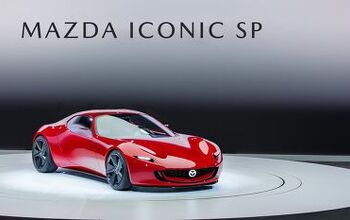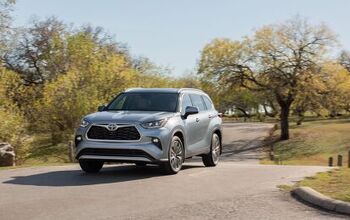By the Numbers: April Showers Brought No Relief
Remember back in 2004, Ford unveiled its new Focus and announced "The Year of The Car?" FoMoCo's cash cow was (and still is) a pickup truck. Clock FoMoCo's passenger car offerings four years later, and you'd be forgiven for thinking the auto show hyperbole was just that. But now it's here for real: the year of the car. In April, passenger cars outsold trucks in the U.S. new vehicle market for the first time in two decades. This is a truly amazing moment in U.S. automotive history, representing the roll-back of the SUV boom. With federal fuel economy regulations in the offing, it's unlikely that even a huge drop in gas prices can reverse the tide. Let's take a closer look at this watershed month.
Passenger car sales rose 4.5 percent (April '07 vs. April '08). Truck sales fell by 17.2 percent. When the blood was cleaned off the carpet, U.S. new passenger vehicle sales ended-up 6.8 percent below last April's total. So far this year, car sales are down 1.5 percent and truck sales 13.4 percent, producing a 7.7 percent drop overall. That's the big picture; now let's look at a few specifics…
Pickup Trucks
The Chevy Silverado suffered a 24.7 drop from April of 2007; year-to-date (YTD) sales sank 20.8 percent. While F-Series still holds onto its "best selling vehicle" title, sales were off by 21 percent for the month, down 15.5 percent for the year. Even huge incentives and sweet deals couldn't pull the Dodge Ram out if its death spiral, finishing April 23.3 percent below last year; down 24.2 percent YTD. For the first time since the new model was introduced, the Toyota Tundra ended the month below last year; April sales slipped six percent. But they're still up 24.8 percent YTD.
Passenger Cars
The Chevy Malibu continues its sales climb, ending the month 39.5 percent above last April, 22.5 percent ahead of last year. Ford's Fusion also had a good month. Sales ascended by 22.4 percent for month, six percent on year. Chrysler wasn't so fortunate. The 300 dropped 36.8 percent for the month, down 22.2 percent on the year. The Toyota Camry managed to stay 5.6 percent ahead of last April, 2.3 percent ahead YTD. Honda Accord sales jumped 17.5 percent for the month. But that's up just 0.2 percent for the year.
Truck-based SUVs
It's no wonder that GM is shutting down SUV production for the year. Tahoe sales finished April down a whopping 29.4 percent, trailing 27.1 percent YTD. Ford and Chrysler may want to consider following GM's lead. Explorer sales declined 38.5 percent from last April; 25 percent YTD. Dodge Durango was even worse. Sales are now so low that a difference of only 2k sales from last April resulted in a 38.5 percent drop; year to date the Durango dies by 38.6 percent. Toyota's Sequoia continues selling above last year, with a 34.4 percent gain for April and a 17.9 percent growth for the year so far.
CUVs
For the first time this year, sales of GMC's Acadia dropped below the previous year's, ending the month down 8.8 percent. However, thanks to a very strong showing in the first quarter, Acadia sales are up 43.3 percent YTD. Ford's Edge edged ahead of last April by 13.1 percent, bettering last year's sales by a whopping 37.9 percent. The Toyota Highlander was down 1.1 percent for the month, but still managed to stay 5.3 percent ahead of the first four months of 2007. Honda's Pilot went the other way, ending 1.3 percent ahead of April 2007, down 5.4 percent for the year.
Prius
It's no wonder that Toyota is thinking about expanding Prius into an entire line of vehicles. Sales are booming. We're talking about a 66.6 percent surge in April and a 22.6 percent gain over this time last year. With gas prices continuing to climb, demand for Toyota's rolling computer doesn't seem to be likely to diminish any time soon.
Total Sales
Historically, overall vehicle sales tend to dip in April. When you start the year well below the previous year, dips tend to look more like a swan dive off the ten-meter board. GM ended April 16.2 percent below last April and starts May down 13.2 percent for the year. Ford did slightly better, dropping only 12.1 percent for the month and 9.8 percent for the year. Chrysler would gladly swap places with either of them, with sales down 23.5 percent compared to April '07 and down 17.6 percent for the year. The transplants fared a bit better than the natives. Toyota finished the month 3.4 percent ahead of last April but down 3.3 percent on the year. Honda had the best showing of all, increasing 6.8 percent in April and up 1.5 percent year to date.
The Future
Next month, we'll see if GM's production cutbacks (and strikes) have any impact on their sales. Toyota's announced price increases may throw a spanner in the works. (Or not.) And Chrysler's cut-rate gasoline promotion could ignite sales. (or not.) One thing's for sure: it may be the year of the car, but for the domestics, it's not the carmaker's year.
More by Frank Williams
Latest Car Reviews
Read moreLatest Product Reviews
Read moreRecent Comments
- Sobhuza Trooper That Dave Thomas fella sounds like the kind of twit who is oh-so-quick to tell us how easy and fun the bus is for any and all of your personal transportation needs. The time to get to and from the bus stop is never a concern. The time waiting for the bus is never a concern. The time waiting for a connection (if there is one) is never a concern. The weather is never a concern. Whatever you might be carrying or intend to purchase is never a concern. Nope, Boo Cars! Yeah Buses! Buses rule!Needless to say, these twits don't actual take the damn bus.
- MaintenanceCosts Nobody here seems to acknowledge that there are multiple use cases for cars.Some people spend all their time driving all over the country and need every mile and minute of time savings. ICE cars are better for them right now.Some people only drive locally and fly when they travel. For them, there's probably a range number that works, and they don't really need more. For the uses for which we use our EV, that would be around 150 miles. The other thing about a low range requirement is it can make 120V charging viable. If you don't drive more than an average of about 40 miles/day, you can probably get enough electrons through a wall outlet. We spent over two years charging our Bolt only through 120V, while our house was getting rebuilt, and never had an issue.Those are extremes. There are all sorts of use cases in between, which probably represent the majority of drivers. For some users, what's needed is more range. But I think for most users, what's needed is better charging. Retrofit apartment garages like Tim's with 240V outlets at every spot. Install more L3 chargers in supermarket parking lots and alongside gas stations. Make chargers that work like Tesla Superchargers as ubiquitous as gas stations, and EV charging will not be an issue for most users.
- MaintenanceCosts I don't have an opinion on whether any one plant unionizing is the right answer, but the employees sure need to have the right to organize. Unions or the credible threat of unionization are the only thing, history has proven, that can keep employers honest. Without it, we've seen over and over, the employers have complete power over the workers and feel free to exploit the workers however they see fit. (And don't tell me "oh, the workers can just leave" - in an oligopolistic industry, working conditions quickly converge, and there's not another employer right around the corner.)
- Kjhkjlhkjhkljh kljhjkhjklhkjh [h3]Wake me up when it is a 1989 635Csi with a M88/3[/h3]
- BrandX "I can charge using the 240V outlets, sure, but it’s slow."No it's not. That's what all home chargers use - 240V.































Comments
Join the conversation
Add me to those happy to see the popularity of the "truck" waining. Why anyone would ever want one as a commuter to an office job is beyond me, SUV's & CUV's included. As for their utility, the guys at the lumberyard are always amazed how much I can haul in an Accord with the back seat folded down...or on a roof rack.
Hi Frank, As always your charts give more clarity than all the quacking of so-called industry analysts. One request. How about a line on the manufacturer graphs that shows equivalent of last years monthly results adjusted for the months decline industry wide (example: if the industry is down 10% there is a data point 10% down from the previous year, if the 2008 data was off 5% it would fall above it, off 15% it would fall below). It would illustrate how the companies are doing in the buying publics eyes better, I think, than the raw numbers do. Will we see another update on the small car numbers? Thanks for your efforts. Bunter